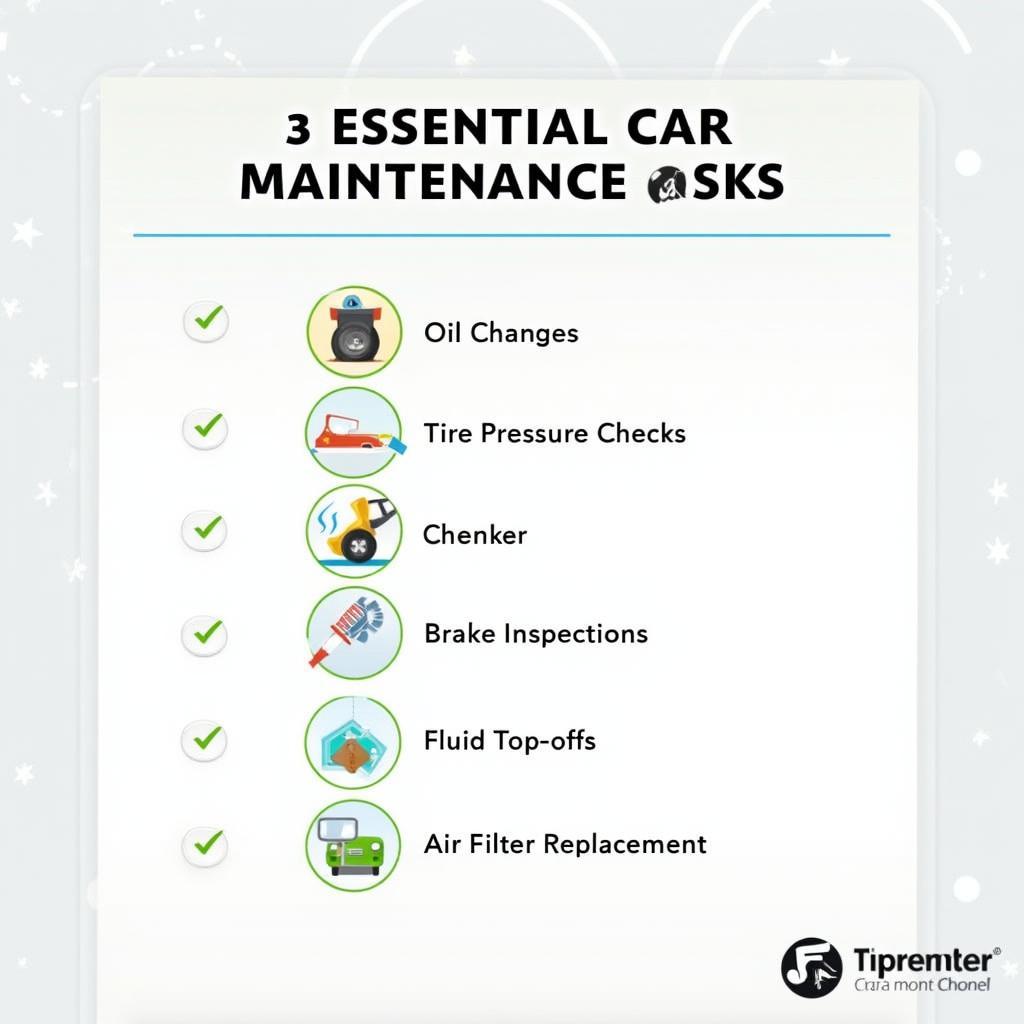Your cart is currently empty!

Car Tips and Tricks for Enhanced Vehicle Performance
Car tips and tricks can significantly improve your vehicle’s performance, longevity, and even your driving experience. From understanding basic maintenance to utilizing advanced diagnostic tools, implementing the right strategies can make a world of difference. This comprehensive guide dives deep into essential car tips and tricks, providing valuable insights for both car enthusiasts and everyday drivers.
Essential Car Maintenance Tips
Regular maintenance is crucial for keeping your car in top condition. Neglecting these simple tasks can lead to costly repairs down the line.
- Regular Oil Changes: Sticking to your car’s recommended oil change schedule is vital for engine health. Clean oil lubricates engine components, reducing friction and wear.
- Tire Pressure Checks: Properly inflated tires ensure optimal fuel efficiency, handling, and tire lifespan. Check your tire pressure monthly and adjust as needed.
- Brake Inspections: Brakes are your car’s most important safety feature. Regular inspections can identify potential problems early on, preventing dangerous situations.
- Fluid Top-offs: Ensure all fluids, including coolant, brake fluid, and power steering fluid, are at the correct levels. Low fluid levels can lead to performance issues and damage.
- Air Filter Replacement: A clean air filter ensures your engine receives the necessary air for combustion. Replace your air filter according to the manufacturer’s recommendations.
 Essential Car Maintenance Checklist
Essential Car Maintenance Checklist
Leveraging Diagnostic Technology for Car Troubleshooting
Modern vehicles are equipped with sophisticated diagnostic systems. Understanding how to use these systems can empower you to identify and address issues quickly.
- Check Engine Light: Don’t ignore the check engine light. It’s your car’s way of telling you something is wrong. Use an OBD-II scanner to retrieve diagnostic trouble codes (DTCs) and pinpoint the problem.
- OBD-II Scanners: These handy tools provide access to your car’s diagnostic data, allowing you to understand the root cause of various issues.
- Data Analysis Software: Advanced software can analyze data from your OBD-II scanner, providing in-depth insights into your car’s performance.
Fuel Efficiency Tips and Tricks
Saving money on gas is a priority for many drivers. Here are some simple tips to improve your fuel economy.
- Smooth Driving Habits: Avoid aggressive acceleration and braking. Smooth driving can significantly improve your fuel mileage.
- Maintain Proper Tire Pressure: Underinflated tires increase rolling resistance, leading to reduced fuel efficiency.
- Reduce Idle Time: Avoid excessive idling, especially in traffic. Turn off your engine if you expect to be stopped for more than a minute.
- Lighten the Load: Remove unnecessary weight from your vehicle. Carrying extra weight reduces fuel economy.
- Use Cruise Control: Cruise control can help maintain a consistent speed, improving fuel efficiency on long highway drives.
Conclusion
Implementing these Car Tips and tricks can significantly enhance your vehicle’s performance, longevity, and your overall driving experience. From basic maintenance practices to utilizing advanced diagnostic technology, taking proactive steps to care for your car can save you time, money, and potential headaches down the road. Remember, regular maintenance and timely repairs are investments that pay off in the long run.
FAQs
- How often should I change my car’s oil? Refer to your owner’s manual for the recommended oil change interval.
- What should I do if my check engine light comes on? Use an OBD-II scanner to retrieve diagnostic trouble codes and consult a repair manual or mechanic.
- How can I improve my car’s fuel efficiency? Maintain proper tire pressure, practice smooth driving habits, and reduce idle time.
- What are the benefits of regular car maintenance? Regular maintenance extends the life of your vehicle, improves performance, and prevents costly repairs.
- What are some essential tools for car maintenance? A basic toolkit should include wrenches, screwdrivers, pliers, and an OBD-II scanner.
- What are some common car problems that can be diagnosed with an OBD-II scanner? Misfires, oxygen sensor problems, and emissions issues.
- How can I find a reliable mechanic? Ask for recommendations from friends and family or check online reviews.
Need further assistance? Contact us via WhatsApp: +1(641)206-8880, Email: [email protected] or visit our office at 456 Pine Avenue, Toronto, ON M5V 2J4, Canada. Our customer service team is available 24/7.

Leave a Reply